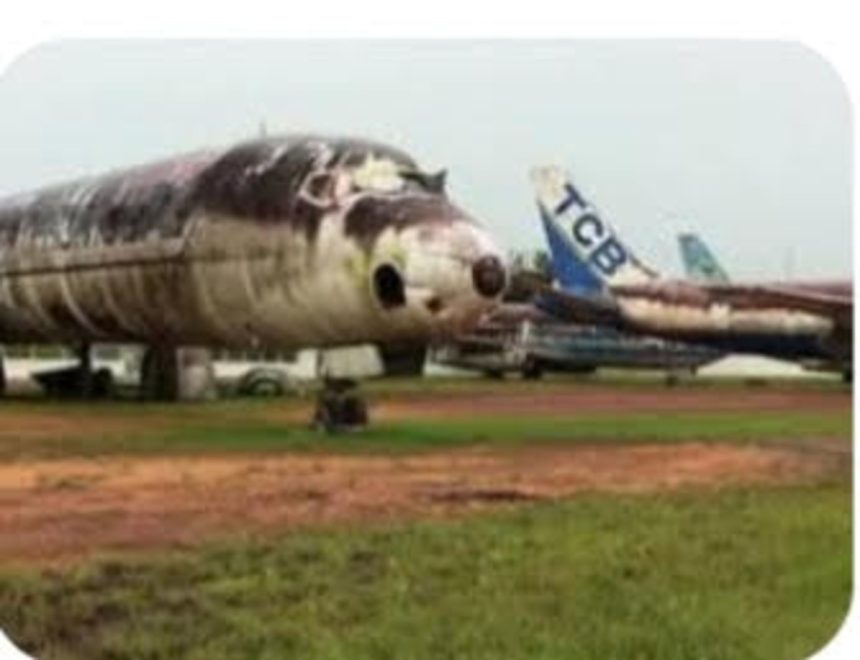Nigeria’s aviation industry has been one of the hardest hit in cumulative Nigerian economy, with over 60 airlines folding up in the past three decades.
The country’s domestic airlines have been particularly traumatized, with many notable carriers, some of them, household names, including the national carrier, Nigeria Airways, leaving the scene in quick succession.
Some of the airlines currently demised by hot operational environment and at times, poor managements are: Nigeria Airways, former national carrier, liquidated in 2003, ADC Airlines, a regional carrier that ceased operations in 2007, Bellview Airlines which shut down in 2009.
Others are: Sosoliso Airlines, which ceased operations in 2006, Chachangi Airlines which ceased operations in 2012, Virgin Nigeria/Air Nigeria, (a national flag carrier that went through name changes and ceased operations in 2012), Albarka Air, which ceased to operate in 2005, Okada Air (1983 to 1997), Kabo Air.
Others include: EAS Airline, Afrijet Airline, Air Meridian Associated Aviation Barnax Airline, Dasab Airline, Hak Air, Harka Air, IRS Airline, Gas Air, Oriental Air, and many more.
There are currently 23 airlines struggling to stay afloat in Nigeria as at press time.
Reasons for the collapse of these airlines are varied, but high operating costs, an unfriendly business environment, and a lack of support from the past government are all contributing factors.
The cost of aviation fuel, which has quadrupled in recent years, has made it difficult for airlines to operate profitably.
Additionally, the Nigerian Civil Aviation Authority’s (NCAA) ruling after an earlier audit, sequel to a series of air accidents in the early parts of 2000, that airlines must have more than one aircraft to operate safely, is putting further pressure on today’s struggling carriers.
Many airlines that are still operating in Nigeria are doing so with just one or two aircraft, and are struggling to stay afloat.
The industry is plagued by financial difficulties, with many airlines owing millions of dollars in debt.
Lack of support from past government has also made it difficult for airlines to access foreign exchange, which is essential for accessing spare parts, carrying out due checks on aircraft, and procuring other essential equipment.
Despite these challenges, some airlines have managed to survive and even thrive.
But Dana Air, for example, operated for over 15 years of scheduled operations and flew over 36 million passengers before it developed a fatigued week and had to seize operations.
ValueJet and Air Peace are among the few airlines that have managed to stay afloat, despite financial difficulties.
The collapse of so many airlines in Nigeria has had a significant impact on the country’s economy and its people.
Many jobs have been lost, and the lack of competition has led to higher prices and reduced services.
The present government is taking action to support the industry and create a more favorable business environment.
This includes regulating fuel costs, providing support for airlines, and implementing policies that promote the growth of the industry.
The future of Nigeria’s aviation industry is certain, but one thing is clear: something needs to be done to prevent further collapse and promote growth.
The government, airlines, and other stakeholders, at this point, have to work together to address the challenges facing the industry and find solutions that will benefit the country and its people.
By doing so, Nigeria’s aviation industry can recover and continue to play a vital role in the country’s economy.
According to Femi Erinfolami, accountant and frequent flyer: “with the right policies and support, Nigeria’s airlines can recover and continue to play a vital role in the country’s economy.”
The shutdown of these airlines has also had a significant impact on passengers, who are left stranded and forced to seek alternative travel arrangements. The government must ensure that passengers are protected and that airlines are held accountable for their actions.
In conclusion, the aviation industry in Nigeria is facing significant challenges, with over 70 airlines ceasing operations in recent years. The government must take action to address these challenges and create a more favorable environment for airlines to operate.
ALSO READ TOP STORIES FROM NIGERIAN TRIBUNE






